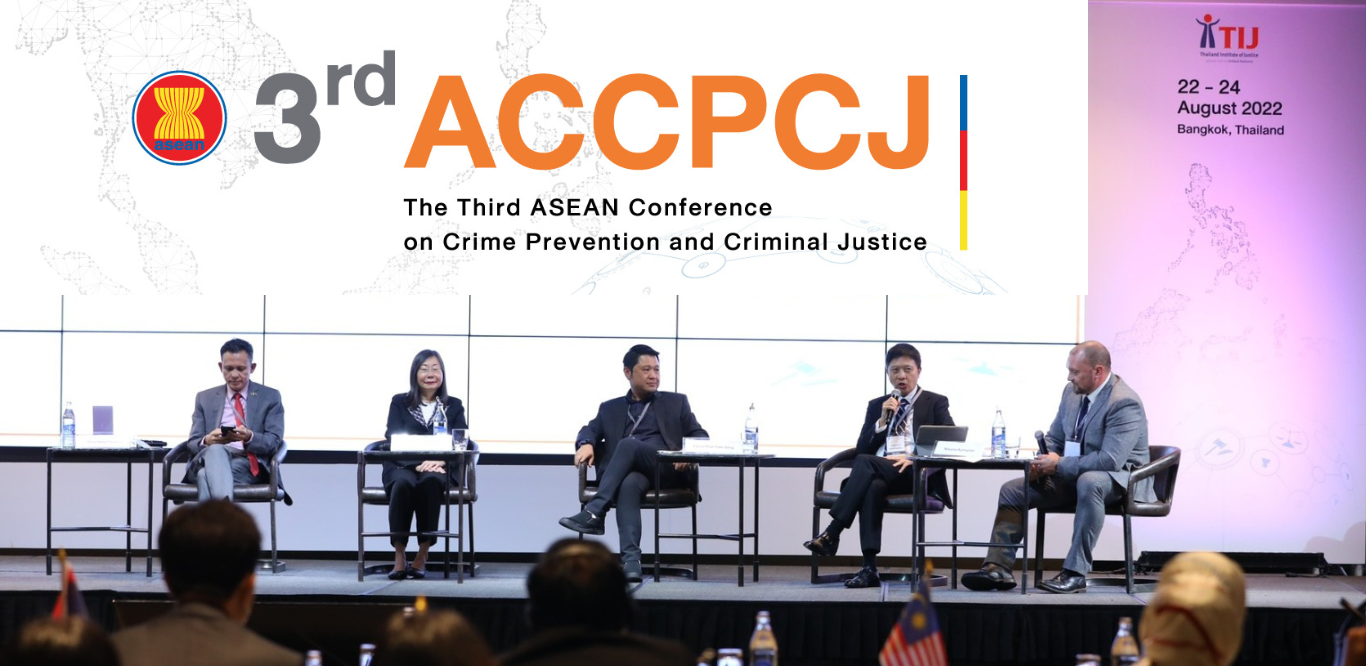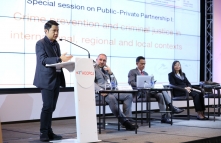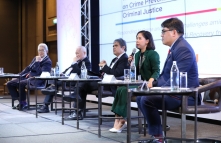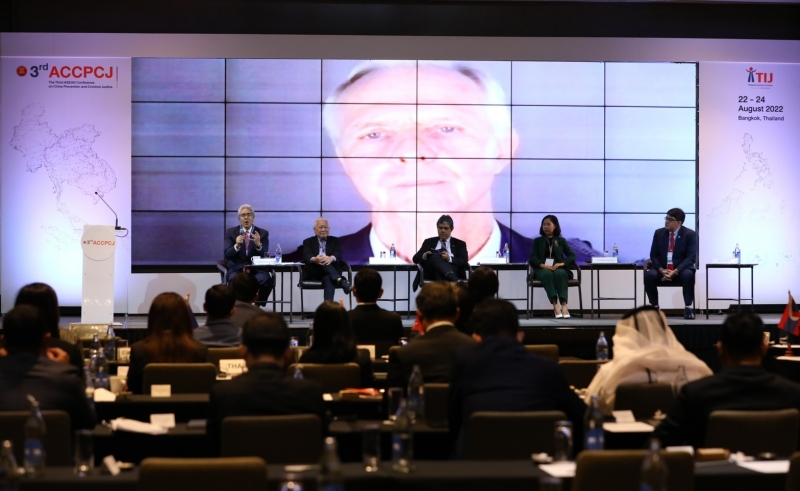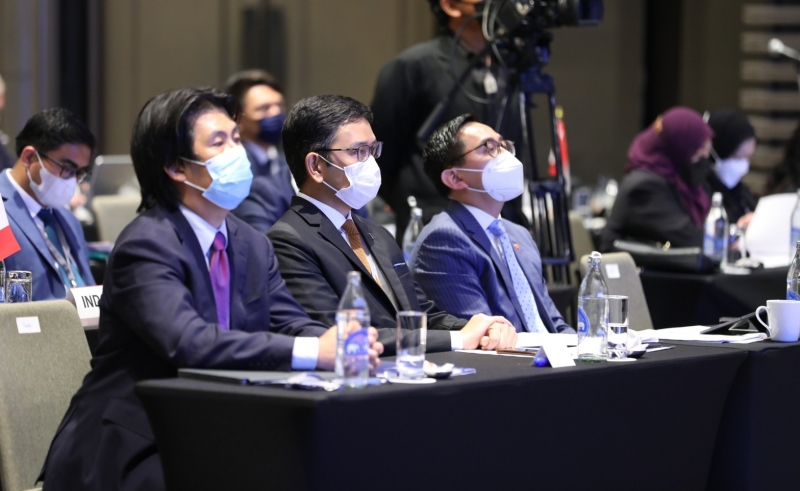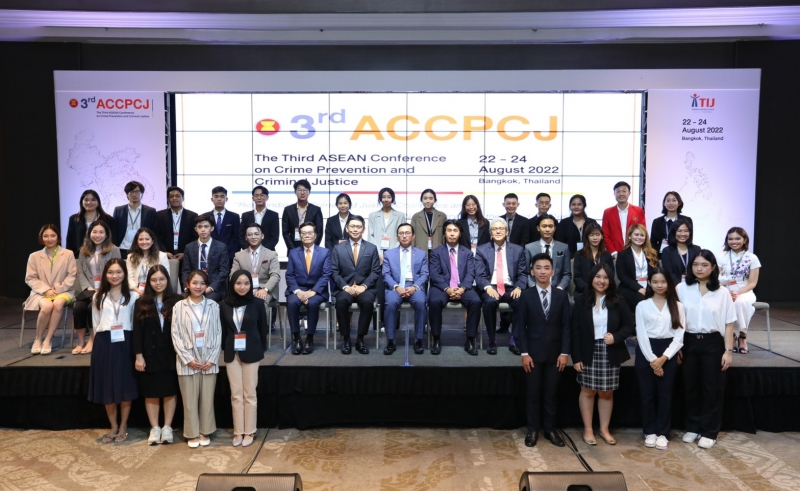The 3rd ASEAN Conference on Crime Prevention and Criminal Justice (ACCPCJ): “Responding to Crime and Justice Challenges amidst ASEAN Recovery from the Covid-19 Crisis” was organised by Thailand Institute of Justice (TIJ). At the conference, participants from ASEAN join together to discuss way forwards to tackle challenges faced by the criminal justice system in the Post-Covid 19 in accordance with the concept of the ASEAN Declaration on Culture of Prevention for a peaceful, inclusive, resilient, healthy and harmonious society.
Special Session on Public-Private Partnership I and II: Crime prevention and criminal justice in international, regional and local contexts
This session discussed how collaboration and coordination in ASEAN and beyond could remarkably assist in crime prevention and criminal justice. The session divided into two meeting; the first involved crime prevention and criminal justice in international, regional and local contexts and the second meeting revolved around the world of digitalization and innovation.
The session started with a presentation on an upcoming study on partnerships, and their roles in development. Characteristics of effective partnership collaborations were identified as including stakeholder independence; shared ownership of decisions; and joint responsibility by all partners. Strategic and communicative partnerships differ, where strategic partnerships are transactional, with relationships driven by competition and a need for attribution. Communicative partnerships are transformational, where partners contribute equally; and operate with mutual trust and respect.
A key point was that the investment sector has been recognised as a driving factor in reducing crime, lead to economic growth which had strong correlation with a reduction in poverty, inequality and unemployment, and an impact on lower crime rates. Panellists also spoke about the necessity to develop the right ecosystem for optimal cooperation across different stakeholders and sectors. There was also discussion on inclusive investment and investment as a tool for crime prevention.
Data was also presented to demonstrate how cybercrime has evolved over the years. Cybercrime damage was estimated to be 6 trillion USD in 2021, which was expected to grow to 10.5 trillion USD by 2025. Whereas it was recognised that cybercrime is borderless, it was also a regional and a local issue, and it requires better cooperation and collaboration at all levels. Statistics also suggest that 95% of cybercrime is due to human error, and thus could be partially reduced if proper measures were in place.
At the second meeting, panellists exchanged on how multi-sectoral collaborations between government agencies, the private sector, civil society and youth organisations could bridge the gap in crime prevention and cybercrime through strengthened partnerships. The key recommendations included online governance which could be built through multi-stakeholder collaborations and inputs, especially from civil society organisations; and through better implementation of model guidelines provided by international organisations.
Moreover, digital literacy is an important issue to enhance people’s performance as well as to provide significant information about online risks and vulnerabilities, especially, to support youth participation in generating new ideas on how to change the world for the better. The youth must be equipped with necessary information required to make valuable decisions, e.g., through cybercrime knowledge workshops in schools, best practices while surfing the internet, and other advocacy measures.
Cluster I: Conference on Cybercrime
Main concept of the panel focused on aspects related to combating cybercrime, the need to strengthen international cooperation that pertains specifically to cybercrime, emerging challenges in cybercrime during the Covid pandemic, addressing traceability, volume, cryptocurrency, and ease of cybercrime, the role of private sector in fighting against cybercrime, capacity-building to combat cybercrime.
The conference revolved around the recognition that technology and innovation has enabled increased remote to work systematically and practically, and this led to improved Internet penetration, but also unavoidably increased vulnerabilities and risks. These changes needed better governance tools, such as data privacy rules and platform governance. The youth discussion on cybercrimes, where it was pointed out that, in such crimes, the youth are not only the victims, but are also often the perpetrators; this is because the youth are not fully aware of the law and policy around such crimes. Remedial measures and crime prevention policies must factor this in, and preempt it through better engagement with youth and restorative justice methods.
The key recommendations from the conference are; interstate cooperation to share information and regulations regarding cybercrime, Public-Private Partnerships to tackle cybercrime, human resource development, reviewing and forging existing initiatives, and ASEAN outcome document on cybercrime and crime prevention, as well as ASEAN comprehensive recovery framework, raising awareness on cybercrime, and the advancement of technology.
Cluster II: Conference on Justice Reform
This cluster focuses on promoting the exchange of information and instructions for justice reform and providing insights to support the development of innovative tools for the justice systems in our region. It is also the discussion to take a step forward to strengthen regional collaboration for justice reform in response to the criminal justice issues after the COVID-19 pandemic including prison overcrowding and access to justice.
One panelist stated that “Prison management and the Covid-19 pandemic” report provides an overview of prisons in ASEAN countries. When the pandemic started in 2020, panic affected many prisons and there were riots and protests as a result of fears inside prisons. Prisoners concerned the impact of Covid-19 heavily. They felt unsafe and isolated from the outside, losing contact with their families, while prison staff have to work long hours and got anxiety over the situation. Reintegration also hampered by the fact that the prison work is not applicable in the real world and not relevant in a Covid-stricken environment as well as economic downturn. While good momentum of extra usage of technology has also been mentioned such as the use of CCTV, body scanners, and teleconferencing to ensure minimum human interaction. This positive change has reduced caution/fear towards technology, including, promoting the use of technology for rehabilitation as well as security
In 2021, the UNGA passed a resolution titled, “Strengthening Criminal Justice Systems During and after the Coronavirus Disease (COVID-19) Pandemic” (A/RES/76/184). The resolution takes into account the lessons learned and best practices in order to cope with the Covid-19 and challenges that we may find in the future. Ensuring sentencing is proportionate to the crime committed and promoting alternatives to imprisonment in various stages of criminal justice as a long-term solution to these problems. Significant number of pre-trial detainees in many places becomes an issue. Also, it includes gender specific issues; access to health services, childcare issues.
Key recommendations proposed by the panelists included a case study from the Philippines where the government collaborate with various networks, for example, GOs & NGOs to establish health protocols during the Covid-19 pandemic and guidelines are modified depending on the outcome as well as the guidelines from the local and national levels.
The Thai representative stated that human rights education is a pathway to criminal justice reform. To do so, there needs to be an implementation of the right-based approach in education, especially in school to create and nurture a society and system which has respect for human rights and dignity.
Another approach is to support the implementation of restorative justice practices which is a part of many countries’ traditional customs and ceremonies. The practices are related to the expression of remorse and the realignment of relationships between conflicting parties. It offers both an alternative and a complement to the mainstream criminal justice process by shifting attention from punishment and retribution to mediation and reconciliation that helps restore relationships and repair the harm caused by crime. Overall, restorative justice can be used as a prerequisite before bringing cases to the formal criminal justice system, or used as a combination, or even separately used in a different system aside from the normal criminal justice process. However, some of the main challenges practitioners reported involved: the limitations imposed by the law (e.g., eligibility criteria for reoffending people); dealing with the public’s lack of awareness and understanding of restorative justice. Training and capacity-building activities relating to restorative justice, whether theoretical or practical, are not regularly offered. Thus, it is suggested that restorative justice should be everyone’s matter to cooperate and to implement restorative justice into society.
Apart from practitioners, an ex-offender had an opportunity to voice his opinion on justice reform. He said that although there are many programmes aiming at peaceful reintegration for the offenders, the willingness to change must come from within. Because if the inmate does not believe in the need to change, then nothing can make it work.
Lessons learned from the panelists that could be beneficial for the justice reform also included; Legal scene in entertainment and prosecutorial reform in South Korea, the Usage of Legal Technology in Singapore and the Philippines, and the proposal to reform the law and regulations from the views of outsiders who face the pains from laws and judicial systems.
Cluster III: Conference on International Cooperation
Owing to the limitation on traveling in the Covid-19 era, ASEAN and other countries agreed to cooperate on Mutual Legal Assistance (MLA) in order to tackle challenges in transnational crime. MLA is a series of processes, including identifying the legal basis for cooperation, establishing channels of communication and for transmission of requests, collecting information on legal and process requirements, drafting requests, and formally transmitting requests. MLAs may be based on treaties or also on the basis of reciprocity and domestic law.
This session focused on formal and informal methods of providing mutual legal assistance in matters involving transnational crime. The formal MLA that ASEAN implemented is called Treaty on Mutual Legal Assistance in Criminal Matters. In addition, ASEAN also has informal tools process to support the MLA, e.g., the South East Asia Justice Network (SEAJust) and Criminal Justice Forum for Asia and the Pacific (Crim-AP). Both organisations were set up during the pandemic; they offer platforms for regular meetings between designated authorities and focus on knowledge sharing and capacity building. These platforms have helped strengthen political commitment, foster mutual trust, and awareness-raising among central authorities as well as other law enforcement officials. The objective is not just to share information, but also good practices. Practitioners also get to know about how MLA requests are processed by receiving jurisdictions, which are otherwise not publicly documented. Efforts are ongoing to develop synergies between SEAJust and Crim-AP.
The ASEAN Senior Law Officials Meeting (ASLOM) was also recognized as a key platform and actor in bridging cross-sectoral gaps. ASLOM’s work prevents duplication and overlap in work done by sectoral bodies in ASEAN; it encourages collaboration, and in turn, more effectiveness. The ACCPCJ forum was also recognized as an important platform.
However, it was recognized that international cooperation was essential in tackling transnational crimes, as no country can tackle such wide-ranging complex crimes on its own. A key challenge is the different legal systems operating in different jurisdictions. In ASEAN, countries variously follow civil and common law systems, which create problems of cooperation and implementation of criminal matters. It was also noted that the ASEAN MLA Treaty was concluded in 2004, and while it remains a strong legal basis for cooperation, the nature of crimes themselves is constantly changing.
In conclusion, the panelists recommended that informal channels, e.g., the existence of SEAJust and Crim-AP can empower the act of crime combating while MLATs should keep up with new challenges of crime changing. Moreover, ASEAN should work for international cooperation for “universal jurisdiction” within international and national frameworks. Lastly, for the challenges of cybercrimes, ASEAN must train law enforcement officials and the public on cybercrime and online safety and cooperate with multi-stakeholders to mobilize resources to control the issue.
The ASEAN Youth Forum on “Future of Justice in the Digitized World”
ASEAN Youth joined the 3rd ACCPCJ forum and presented their projects on the theme of “Future of Justice in the Digitized World” on the last day of the conference. The ASEAN Youth were divided into 5 groups to share their ideas on (1) Identity in the Metaverse, (2) Legal Liability in the Metaverse, (3) Human Rights and the Metaverse, (4) Safeguarding Creativity in the Metaverse, and (5) the Metaverse Monopoly.
The main topics in the discussion is digitized crime, e.g., stealing identity, online harassment, leak of personal data, and exploitation of the vulnerable, many problems are results of digital inequality; inaccessible to digital literacy and technology equipment.
All of the above led to interesting questions, for example; if our online identity has been assaulted, how could we verify and authenticate our online identity, and how would we do with the culprit? This problem has been reported in the Meta platform, but no one was punished.
Another case study is scammers, many countries in ASEAN are facing this problem together. Now, the region has the MLAT to tackle the issue. However, some questions remain unanswerable. As some of the offenders are from vulnerable groups; migrants and less educated. They are also victims of online exploitation. How should ASEAN do with this challenge?
Key recommendations to prepare ASEAN for the Future of Justice in the Digitized World vary. In summary, they suggested that ASEAN should raise awareness to and equip the vulnerable groups with digital literacy, update laws and regulations, call for financial and capacity support to tackle cybercrime, and close collaboration among the public-private-people partnerships.



